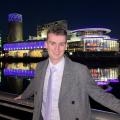
THOUSANDS of people across Colchester celebrated Saint George’s Day on Sunday - but less than 50 per cent of people living in the city identify as English, according to a new national survey.
In the latest population survey from the Office for National Statistics, which covers all of last year, only 41 per cent of Colchester resident said they consider themselves English.
This is down from 66 per cent in the year to June 2016, before the Brexit referendum, and down from 80 per cent in 2004.
Respondents can select as many options as they like from British, English, Scottish, Welsh, Irish or ‘other’.
Each area has varying sample sizes, with the latest survey for Colchester having a sample size of 152, which was the lowest since the Annual Population Survey (APS) was launched in 2004.
In Colchester, 62 per cent of respondents said they identified as British – above the national average of 57 per cent.

Professor John Denham, from the Centre for English Identity and Politics at the University of Southampton, said many people only select one response, despite having "multiple identities".
He said the British social attitudes survey suggests there has been an increase in the numbers saying they are equally English and British, but a smaller rise in the numbers saying they are British rather than English.
While Sunder Katwala, director of the British Future think tank which works to promote diversity and social inclusion, said: "People’s sense of Englishness ebbs and flows.
"You'll see a lot of England flags in June when the Three Lions are competing in the Euros, and then they'll disappear again.
"We could do a lot more to celebrate English identity outside of major sporting moments, in an inclusive way – flying the flag with pride and making sure everyone feels invited to the party on St George’s Day.
"Getting behind a shared English identity could help bring people together."
Nationally, 52 per cent said they were English in the year to June 2016 and the highest level was 59 per cent in 2004 – when the Annual Population Survey (APS) was launched.



Comments: Our rules
We want our comments to be a lively and valuable part of our community - a place where readers can debate and engage with the most important local issues. The ability to comment on our stories is a privilege, not a right, however, and that privilege may be withdrawn if it is abused or misused.
Please report any comments that break our rules.
Read the rules hereLast Updated:
Report this comment Cancel